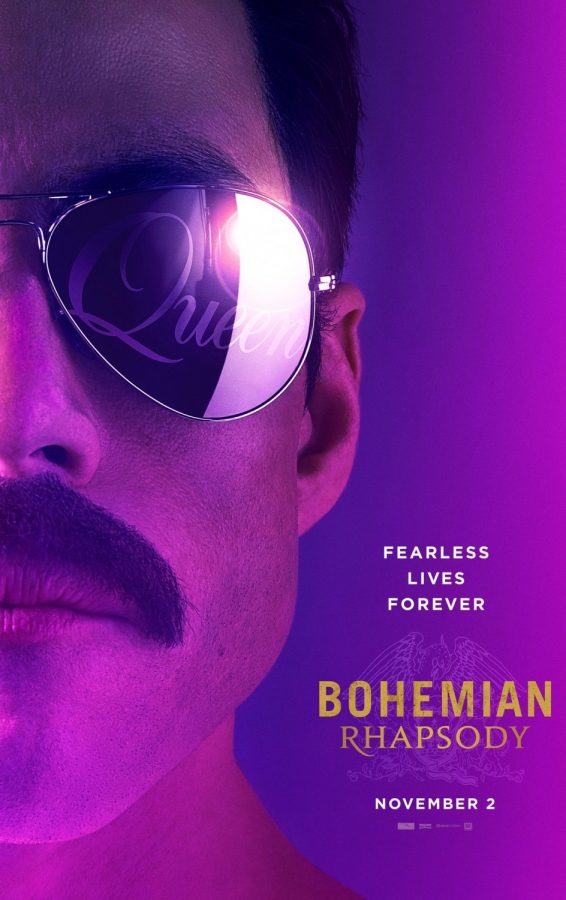REVIEW: Bohemian Tragedy: New film chronicling Queen’s rise to fame does not live up to expectations
The film stars Rami Malek as Freddie Mercury.
The familiar tune of Queen’s song “We Will Rock You” plays, but nobody is singing along. Nobody is drumming to the rhythm. An ironic silence permeates the theater.
Freddie Mercury’s trademark voice is the only component that helps save the emotionless opening montage, which fails to get the audience on their feet. With sloppy editing, rushed plot-lines and amateurish quality, “Bohemian Rhapsody,” released Friday, falls flat on its face and “bites the dust.” It’s a disappointment to those expecting a gripping tale of Queen’s rise to stardom.
“Bohemian Rhapsody” centers on Farrokh Bulsara (Rami Malek), an aimless young man living in London who stumbles upon guitarist Brian May (Gwilym Lee), drummer Roger Taylor (Ben Hardy) and bass guitarist John Deacon (Joseph Mazzello) to form the band Queen.
Queen releases the song “Bohemian Rhapsody,” which becomes a radio hit and launches the band into fame. Bulsara changes his stage name to Freddie Mercury and begins dealing with personal struggles involving his relationship with Mary Austin (Lucy Boynton) and his sexuality. Although he breaks with Queen, Mercury hears about the upcoming Live Aid concert and brings the band together again. During rehearsal for Live Aid, Mercury reveals to his band-mates that he has AIDS.
At Live Aid, Mercury delivers a stellar performance, one of the few moments in the film that pays off, blending shots of the crowd, Freddie at the piano and his band members working their instruments into a near perfect recreation of the actual concert.
While the film definitely has praiseworthy moments, much of it comes in the second half when the band is breaking up and anticipation rises for the Live Aid concert. “Bohemian Rhapsody” does deserve some credit for paying attention to subtle details that would have otherwise made it historically inaccurate. For instance, the Live Aid concert was beautifully choreographed and synchronized with Mercury’s real-life dance moves and voice.
Another emotional moment is when Mercury’s girlfriend leaves him. Although it could have easily been cliché, the scene is saved by cinematic shots of Mercury in the rain, his defeated face a mixture of sadness and dread.
“Bohemian Rhapsody,” however, is by and large a sloppy, lackluster depiction of Queen’s rise to stardom that rushes through their pivotal moments. For instance, in a montage that is suppose to highlight the critical acclaim of Queen’s album “A Night at the Opera,” quotes from random news outlets are scattered across the screen, an editing move that is not only ineffective but ridiculously unprofessional.
Editing in other parts is likewise careless, with rough transitions between scenes and character shots. For example, in one scene, Mercury addresses the press and the camera unexpectedly blurs, an effect that is trying to create tension but ultimately looks poor in quality.
While the film tries to insert comic relief from band members May, Taylor and Deacon, it barely qualifies as humor, resulting in flat, mediocre delivery. Perhaps most disappointing, is how the film takes legendary tracks such as “We Will Rock You,” “Killer Queen” and “Another One Bites the Dust” and adds them to poorly edited montages. There is also a notable moment when Mercury is brooding in the rain while the upbeat tune of “Under Pressure” subtly plays in the background, which is totally awkward and out of place.
Much of the first half is rushed with the backstories of Queen’s band members cut short. However, it does have interesting subplots, such as Mercury’s lyric writing hobby and his inspiration for the song “Bohemian Rhapsody.” The second half does a good job putting pieces together so that by the time everything culminates in the Live Aid concert, the film seems to find itself. As a whole, the film feels like an insightful biography of Queen, but it just does not do it well enough.


